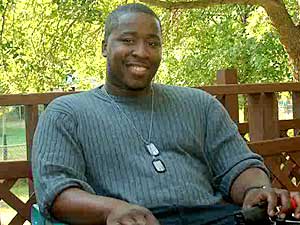|
Audio
Photos
Your Voice
|
Day of resolution
August 22, 2003
 |
| Lou Roberts wants to clear his fines so he can get his drivers license back. (Brandt Williams) |
Minneapolis, Minn. — The defendants will report to the Pilot City Health Center in North Minneapolis where they will appear before a judge who will hear their cases. The judge will attempt to assign a length of community service proportionate to the fine the defendant owes. Participants will then be shuttled around the city to clean up garbage or to do other tasks requested by church and neighborhood groups and the debt will be forgiven.
Lou Roberts says he'll show up on Saturday early to erase $800 worth of tickets on his record.
"I think I had a couple of things from back in '97 when I was still in high school," says Roberts. "I think I had a disorderly or drinking, something I had when I was younger. And I was under the impression that those things were supposed to fall off your record when you turn 18. That's not true."
Roberts, like the majority of the 1,200 people who've signed up for the "Day of Resolution," is African American.
|
"I've got to pay the fine. But in order to pay the fine, I got to get in the car and go job hunting. It's kind of like a circle. You get in the car and drive to go look for jobs, but you get pulled over. You don't have a license and boom. Another ticket, another fine."
- Lou Roberts |
Roberts is 25-years-old with a two-year-old son. He's currently doing temp work, but says it's hard to get around to work without a drivers license. Roberts won't be able to get his license back until he pays his fines.
"I've got to pay the fine. But in order to pay the fine, I got to get in the car and go job hunting," says Roberts. "It's kind of like a circle. You get in the car and drive to go look for jobs, but you get pulled over. You don't have a license and -- boom. Another ticket, another fine."
Gary Cunningham is the director of the Pilot City Health Center and directs the African American Men's Project - two cosponsors of the "Day of Resolution." He says there are many more young men in situations similar to Roberts. Cunningham says data compiled by the Men's Project shows that once an African American man is arrested and jailed, there's an 80 percent chance he'll be back in jail for a more serious crime.
"So, if we can get them at this level, where they're just in the system, barely, and address that now, we're not only going to save the system money, but we're really going to start working to have these individuals do something different with their lives," says Cunningham. "And this is an opportunity for that to happen." About 11,000 African American men between the ages of 18 and 30 live in Hennepin County. According to the study, almost half of those men are sent to jail each year. Cunningham says it costs the state, city of Minneapolis and Hennepin County about $219 million annually to arrest, book and jail them.
"We started asking the question, 'what happens with them once they get booked into jail and what is this about?' Most of those offenses were for misdemeanors, traffic tickets and warrants. It was causing the system a huge amount of money," Cunningham says.
Cunningham credits Hennepin County Chief Judge Kevin Burke for making the event happen. Burke says there are many more people with unresolved cases than those who attend the event. But he says this is a good start.
"Our history has been we're at a standoff," says Burke. "The defendent doesn't acknowledge responsibility for his or her behavior. We basically just keep churning through the system. And it doesn't work for anyone."
Burke says getting all the participants in to see three or four judges is an ambitious undertaking. He says they didn't expect so many people would sign up. But says they'll try to get as many people through as they can. Job placement services and health screenings will also be available for participants.
|
News Headlines
|
Related Subjects
|
